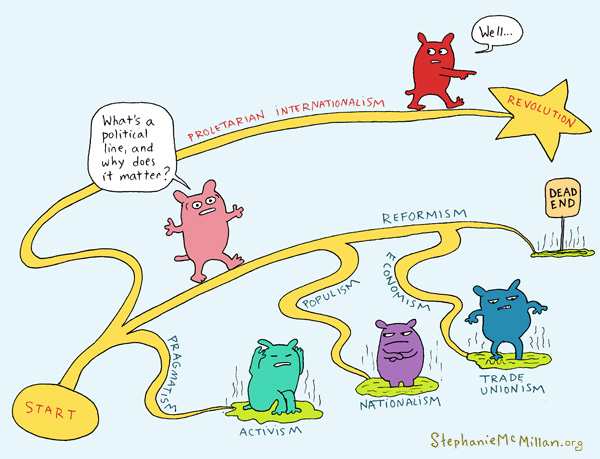
Jan Makandal
September 24, 2015
The concept of “democratic socialism” is a metaphysical “system creation,” or capitalist upgrade with a bit of Marxist flavor. To be more blunt, it is an attempt to strip Marxism of its proletarian content by ignoring the antagonistic relation between capital and labor. It serves the interest of the petite bourgeoisie, who want more equality, but ultimately will not break with the capitalist class. “Democratic socialism” doesn’t challenge or overturn capitalism, and is therefore not socialist. It is in fact in the interests of capitalists. At best, it is a slightly reformed capitalism with a few “socialistic tendencies.”
Marx and Engels first demarcated from these kind of utopian schemes by clarifying that proletarian science is not political economy. This was a warning that it would be totally impossible and undesirable for proletarian science to fix capitalism or make it work better. The sole purpose of proletarian science, which is based on historical and dialectical materialism, is to analyze all the different forms of capital accumulation for the defeat of capital, by realizing the dictatorship of the proletariat. That is Scientific Socialism.
Scientific Socialism is the general foundational concept of the proletariat to defeat capital and capitalism. It is the only socialism that exists. It is the application of the science of the proletariat, in any specific social formation, to destroy all forms of concentration of capital and, in the process, construct a higher form of societal organization: Communism.
The working class, the proletariat, is the only class in society that can achieve this goal, by leading an alliance of other dominated classes. Other dominated classes cannot, by their struggle for emancipation, lead society to socialism. Slavery transitioned [not mechanically] either to feudalism or capitalism, other exploitative forms of societal organization. Feudalism transitioned to another exploitative type and form of societal organization under the leadership of the capitalist class, even if it was an objective advancement.
Today, the only class within capitalism that can end that vicious cycle of transitioning to new types and forms of exploitative systems is the proletariat. The proletariat is the only class that produces the foundation for all forms of concentration of capital: surplus value. The surplus value extracted from the labor power of workers in the production process is what allows capital to reproduce.
Since that extraction is in a relation of antagonism, the proletariat has no interest in its reproduction, but rather seeks its abolition. By achieving this, the proletariat will achieve the most historically advanced form of society, making possible the breakdown and elimination of all class divisions, along with their many wretched consequences.
(more…)
 Both the Republican and Democratic conventions are now over. It is time for some additional reflections. First, as per the period of McGovern, the rainbow coalition, Jesse Jackson’s attempt to run and now Bernie Sanders, the reformist and populist left is left holding an empty balloon, deflated by promises to build a movement or a political revolution. These promises are nothing other than demagoguery. Some of these people will hibernate till the next election, hoping that we forget this election experience. Some will hop on the bandwagon of other insignificant candidates, still pushing their opportunist/populist political line.
Both the Republican and Democratic conventions are now over. It is time for some additional reflections. First, as per the period of McGovern, the rainbow coalition, Jesse Jackson’s attempt to run and now Bernie Sanders, the reformist and populist left is left holding an empty balloon, deflated by promises to build a movement or a political revolution. These promises are nothing other than demagoguery. Some of these people will hibernate till the next election, hoping that we forget this election experience. Some will hop on the bandwagon of other insignificant candidates, still pushing their opportunist/populist political line.

